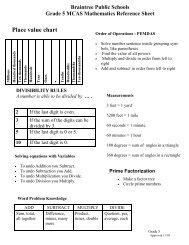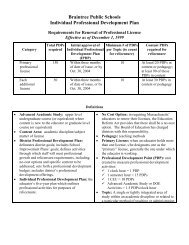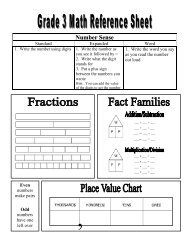Student/Parent Handbook - Braintree Public Schools
Student/Parent Handbook - Braintree Public Schools
Student/Parent Handbook - Braintree Public Schools
Create successful ePaper yourself
Turn your PDF publications into a flip-book with our unique Google optimized e-Paper software.
Massachusetts General Laws Chapter 71, Sections 37H and 37H1/2<br />
In order to maintain an environment conducive to teaching and learning we will declare<br />
unequivocally that weapons, illegal drugs, alcohol, and violent acts have no place in an<br />
academic setting.<br />
The Massachusetts Education Reform Act of 1993 was signed into law on June 18,<br />
1993. This law has a direct impact on some student discipline policies and procedures.<br />
The information contained below details policy and procedural changes that are now in<br />
effect in all schools in Massachusetts. The Massachusetts Education Reform Act<br />
supersedes pertinent discipline policy and procedures that are outlined in the student<br />
handbook. These policies and procedures include:<br />
A. Possession of Weapons / Drugs<br />
B. Assault on School Personnel<br />
It is important for students and parents to understand and be mindful of the<br />
information listed below:<br />
a.)<br />
b.)<br />
c.)<br />
Any student who is found on school premises or at school sponsored or school<br />
related events, including athletic games, in possession of a dangerous weapon,<br />
including, but not limited to a gun or a knife, or a controlled substance as<br />
defined in chapter 94 C, including, but not limited to marijuana, cocaine, and<br />
heroin, may be subject to expulsion from the school or school district by the<br />
principal.<br />
Any student who assaults a principal, vice principal, teacher, teacher’s aide or<br />
other educational staff on school premises or at school sponsored or school<br />
related events, including athletic games, may be subject to expulsion from the<br />
school or school district by the principal.<br />
Any student who is charged with a violation of either paragraph (a) or (b) shall<br />
be notified in writing of an opportunity for a hearing; provided, however, that the<br />
student may have representation, along with the opportunity to present<br />
evidence and witnesses at said hearing before the principal.<br />
After said hearing, a principal may, in his/her discretion, decide to suspend rather than<br />
expel a student who has been determined by the principal to have violated either<br />
paragraph (a) or (b); provided, however, that any principal who decides that said student<br />
should be suspended shall state in writing to the school committee his reasons for<br />
choosing the suspension instead of the expulsion as the most appropriate remedy. In<br />
this statement, the principal shall represent that in his opinion, the continued presence of<br />
this student in the school will not pose a threat to the safety, security and welfare of the<br />
other students and staff in the school.<br />
Any student who has been expelled from a school district pursuant to these provisions<br />
shall have the right to appeal to the superintendent. The expelled<br />
d.)<br />
e.)<br />
student shall have 10 days from the date of the expulsion in which to notify the<br />
superintendent of his appeal. The student has the right to counsel at a hearing<br />
before the superintendent. The subject matter of the appeal shall not be limited<br />
solely to a factual determination of whether the student has violated any<br />
provision of this section.<br />
When a student is expelled under the provisions of this section and applies for<br />
admission to another school for acceptance, the superintendent of the sending<br />
school shall notify the superintendent of the receiving school of the reasons for<br />
the pupil’s expulsion.<br />
Chapter 71, Section 37H ½ - Felony Complaints and Felony Convictions<br />
1. Upon the issuance of a criminal complaint charging a student with a felony or<br />
upon the issuance of a felony delinquency complaint against a student, the<br />
principal or headmaster of a school in which the student is enrolled may<br />
suspend such student for a period of time determined appropriate by said<br />
principal or headmaster if said principal or headmaster determines that the<br />
student’s continued presence in school would have a substantial detrimental<br />
effect on the general welfare of the school. The student shall receive written<br />
notification of the charges and reasons for such suspension prior to such<br />
suspension taking effect. The student shall also receive written notification of<br />
his right to appeal and the process for appealing such suspension; provided,<br />
70
















